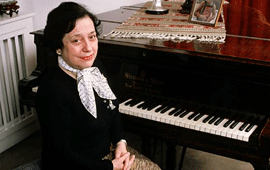> [Archived] Interviews

The Pianist Alicia de Larrocha - one year since her passing away
Up next, we present you parts of an interview she took in 2006, probably the last of the few interviews, the pianist gave throughout her entire career, courtesy of our colleagues from The European Broadcasting Union.
You became famous by performing works from the Spanish repertoire, such as Granados, Albéniz, but also very highly praised works by Beethoven and Mozart.
A little from everything. The maestro Frank Marshall would always say: "You must know all the styles. You may be excelling in one of them, but you must know them. Yo have to go to each and every concert, because when you listen, you have the opportunity to make a correct analysis. It is terrible, but that's how I did it." This is how you become aware of your mistakes, by listening to others.
When you choose a certain repertoire, you have always set high standarts. May I ask you, what are the things you don't like?
I have never wanted to perform works I cannot aproach or I cannot understand. There is not a repertoire I don't like. Of course, I did not want to perform contemporary music, because it surpassed my age. I listen to it, I haven't performedit.
What do you value the most when listening to a pianist? What do you appreciate the most in a performance, be it by a established pianist or by a student?
I will tell you what most people have said and it is true. Professionals who go to concerts do not enjoy the music. Those who have no music knowledge simply listen to it while we think immediately about the structure and the phrasing. There is a great difference; a pianist can have an extraordinary phrasing and another an incredible sonority. So, I cannot tell you for sure.
Your perfomances and recordings assert themselves through the clarity of the sound; each note is crystalline. Is this something that you planned to do?
It is the way I have studied it and I have always performed in this way. If there is a purpose? It may be, I have worked on it even since I was very young.
Do you like doing recording?
Some like doing them, some others don't. I belong to the second group.
However, you made a lot of recordings.
Yes, I have spent a lot of time in the studio. It is a very unsatisfying experience and you wonder whether a certain note was sell sung or not. When you perform live, anything can happen. If a note is wrong, it can be forgotten. But, in a recording, the note will last forever.
Except recording, you performed in a large number of concerts. What was your main concern while playing in a concert?
Almost every time, I seem to forget the public is there, that there is someone out there. I perform for myself, as though I were alone.
Translated by Cristina Mihaela Sandu and Elena Daniela Radu
MA students, MTTLC, Bucharest University














